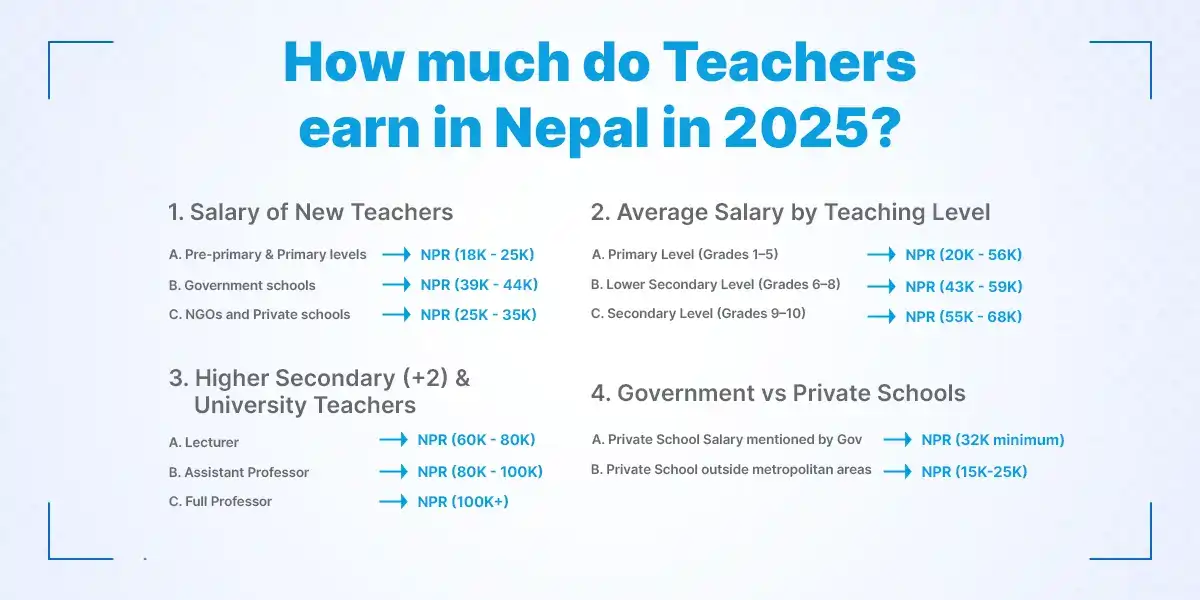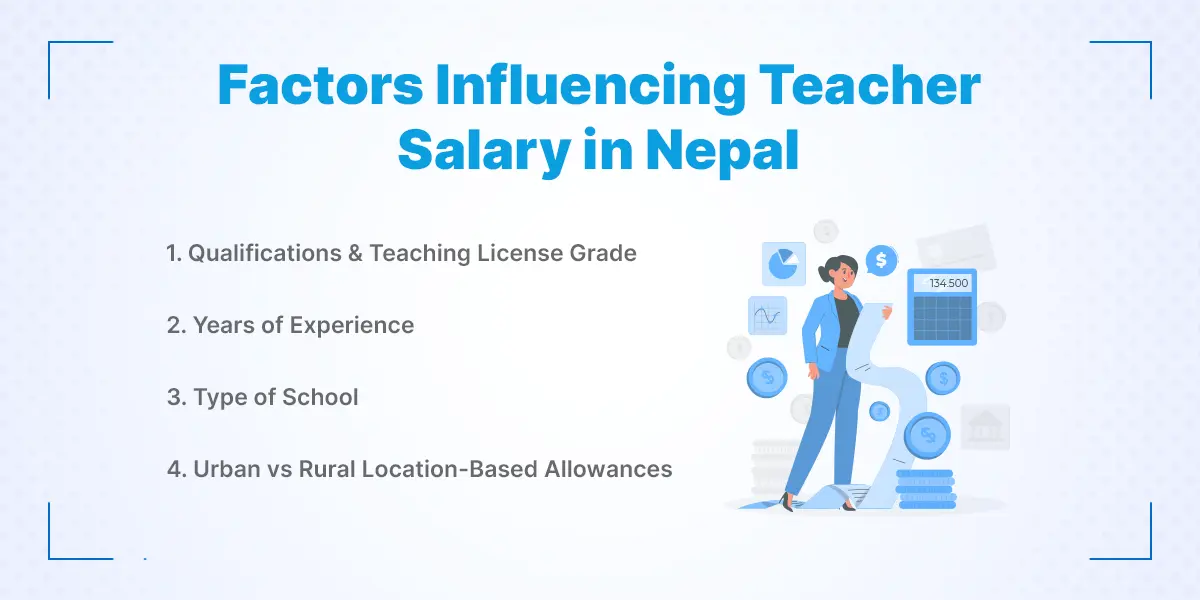
Ever wondered if teaching is a well-paying job in Nepal? Thousands of aspiring teachers and job seekers are asking the same question in 2026. With rising living costs and shifting job landscapes, it has never been more important to find out the real teacher salary in Nepal.
Whether you are thinking of becoming a teacher, are already teaching, or are simply considering career choices, this guide will break things down clearly for you. We'll walk you through level-by-level average salaries, government and private school differences, key benefits, and how you can increase your pay.
In this blog
How much do Teachers earn in Nepal in 2026?
Teachers in Nepal earn between NPR 18,000 and NPR 100,000+ per month in 2026, depending on experience, teaching position, and type of institution. The initial salary may be lower at the beginning of your career, but as you gain experience and start teaching at higher education levels, your pay will increase to a satisfactory level.

1. Salary of New Teachers
If you're a new teacher in Nepal, your pay is primarily dependent on where you work: a government school, a private school, or an international school.
Those working in pre-primary and primary levels in small private schools typically start at as little as NPR 18,000 to NPR 25,000 per month.
In government schools, even a fresh primary teacher with a valid license can earn between NPR 39,484 and NPR 43,994 based on their license grade (3rd or 2nd class).
Better NGOs and private schools in Kathmandu can offer NPR 25,000 to NPR 35,000 to qualified freshers.
The actual difference here isn't experience. It's where you work and what license you possess.
2. Average Salary by Teaching Level
Nepal teacher salaries rise incrementally based on the education level you teach.
A. Primary Level (Grades 1–5)
Government teachers with a 3rd-class license: around NPR 39,484/month
2nd-class: NPR 43,994
1st-class (senior): NPR 55,337
Private schools: generally NPR 20,000 to NPR 30,000
B. Lower Secondary Level (Grades 6–8)
3rd-class: NPR 43,994
2nd-class: NPR 55,337
1st-class: NPR 58,094
C. Secondary Level (Grades 9–10)
3rd-class: NPR 55,337
2nd-class: NPR 61,737
1st-class: NPR 68,145
This is the highest level most school teachers fall into, especially in government/community schools.
3. Higher Secondary (+2) and University Teachers
Pay at the +2 level is quite similar to secondary level teachers, but sometimes slightly more in high-end institutions or in handling multiple subjects.
For college/university lecturers, especially those serving Tribhuvan University or other state universities, wages vary from around NPR 60,000 and go up to NPR 100,000–150,000 if the lecturer is also serving on committees, overseeing thesis work, or teaching additional courses.
The general pattern is:
Lecturer: NPR 60,000–80,000
Assistant Professor: NPR 80,000–100,000
Full Professor: NPR 100,000+
Professors at top private colleges (such as medical or management colleges) can earn even more through bonuses and side work.
4. Government vs Private Schools
Here's the truth that most would not speak aloud:
Government school teachers are better paid, have job security, and enjoy perks such as pension, Dashain bonuses, and frequent salary revisions.
Private school teachers typically get lower salaries (especially in smaller schools), lack job security, and have minimal or no benefits.
Even though the government has set the minimum salary of NPR 32,000 for teachers in private schools, not all of them do that. In reality, private schools offer only NPR 18,000–25,000, especially outside of metropolitan areas.
Factors Influencing Teacher Salary in Nepal
Nepalese salaries for teachers depend on qualifications, the grade of their license, the number of years of teaching experience, the type of school, and the location of the school. Teachers with higher grades of license and more years of experience earn more. The pay is less in rural and private schools than in urban or international schools. Allowances and professional development also significantly impact total remuneration.
Let's break these down simply.

1. Qualifications & Teaching License Grade
Your teaching license grade is among the highest factors that determine salaries in Nepal. TSC issues licenses in 1st, 2nd, or 3rd class, and each of them affects your salary scale. The person with a 1st-class license makes a lot more money compared to someone with a 3rd-class license. Teachers with bachelor’s or master’s degrees are more likely to qualify for better roles and earn higher wages. So, if you’re aiming for a decent salary, upgrading your license and academic qualifications is a smart move.
2. Years of Experience
Experience naturally brings higher pay. In government schools, each year of service often brings salary increments or grade promotions, improving your wage structure. A 10-year experienced teacher will generally earn more than a new teacher, even if they share the same license. But years aren't everything. Training also matters equally. Teachers who attend training sessions or pass internal exams are likely to receive promotions and bonuses. Engaging in training and workshops can truly pay off.
3. Type of School
Where you work also determines your salary level. Teachers in government schools usually earn more, get benefits like pensions, and receive a fixed salary scale. Community schools receive equal government salary scales but might lose some allowances. Private school teachers, especially in small schools, usually earn less than the government. However, premium private and international schools (such as those in Kathmandu or Pokhara) can pay twice or even triple the average salary, especially to trained teachers who are proficient in English. So, your salary can vary significantly just based on the kind of school you choose.
4. Urban vs Rural Location-Based Allowances
Where you teach affects how much you earn. Teachers in cities like Kathmandu, Lalitpur, or Pokhara get extra money for housing and transportation because living in the city costs more. Teachers in rural areas may not get these extras and might have fewer chances to earn extra money. However, some rural jobs offer extra pay for difficult conditions or moving. In short, city teachers earn more, even if they have the same base salary.
How Does Teacher Salary in Nepal Differ by Education Level?
In Nepal, the more educated level you teach at, the higher the pay. Primary school teachers earn the least, and university lecturers earn the most. Your experience, qualifications, and type of school also affect how much you're paid.
Let's break each level down simply.
1. Primary School Teachers (Grades 1–5)
Primary school teachers usually receive the lowest pay among all teaching levels. If you teach in Grades 1 to 5 with young children, your salary may range from NPR 39,000 to NPR 55,000 in government schools. In private schools, it is typically lower, sometimes even NPR 18,000 to NPR 30,000. The teachers at this grade level are required to have minimum qualifications. Some of them also work extra hours or take tuition classes to earn more money. Teachers working in kindergarten up to Grade 1 generally earn even less, but are still highly worth it.
2. Lower-Secondary & Secondary Teachers (Grades 6–10)
If you're teaching classes 6 to 10, your salary is usually a bit higher. In government schools, it is between roughly NPR 43,000 and NPR 68,000, depending on your licensure and experience. These teachers typically teach more subjects and have more responsibilities. Additionally, some schools pay you extra if you teach science, math, or English. Secondary teachers also assist laboratory assistants, especially during lab periods for science.
3. Higher-Secondary / +2 Teachers (Grades 11–12)
In the +2 level, teachers deal with mature students preparing for university. Salary range between NPR 55,000 and NPR 70,000 in the majority of government +2 institutes. Private +2 institutes can provide the same or even higher pay, especially in urban areas. Teachers at this level are expected to be more experienced and subject matter specialists. As they deal directly with students for national exams, their work is considered more serious, and their remuneration is accordingly higher.
4. Professors and University Lecturers
Professors and lecturers are the most remunerated instructors in Nepal. As a professor or lecturer, you can earn NPR 60,000 to NPR 150,000 or above on a monthly basis. Your compensation will depend on your experience, qualifications, and whether you work in a public or private university. Professors who do research supervision, publish research work, or teach extra classes can even earn more. These roles are highly competitive and often require a master's or PhD degree.
Government vs Private School Teacher Salary in Nepal
Teacher pay in Nepal is different for government and private schools. Government teachers usually make more money, receive regular pay increases, and have benefits like pensions and allowances. In contrast, many private schools pay less and may not provide job security or government benefits.
Teacher Salary Comparison: Government vs Private Schools in Nepal
| Category | Government Schools | Private Schools |
|---|---|---|
| Basic Pay | NPR 39,000 – 68,145/month (based on level/license) | NPR 18,000 – 100,000/month (varies by school) |
| Allowances | Festival (Dashain), housing/travel | Rarely offered; occasional festival bonus |
| Provident Fund (PF) | Yes. Mandatory with pension benefits | Mostly unavailable or optional |
| Social Security Fund (SSF) | Included. Covers health, retirement, and accident | Not common in smaller schools |
| Job Security | High: Permanent positions with promotions | Low: Many are on a yearly or contract basis |
| Salary Revisions | Based on the national budget (last revised in 2080–82) | Not fixed; varies by school’s policy |
Benefits Beyond the Payslip
A teacher in Nepal earns more than just a normal salary. There are several additional benefits, especially in government schools. From medical allowances to retirement pensions, these can actually make a big difference in the long run. If you're considering teacher jobs in Nepal, it’s important to understand the full compensation package—not just the monthly wage. Let's have a look at some of the biggest benefits teachers get beyond their basic pay.
1. Medical Insurance
All government teachers in Nepal are covered by the Social Security Fund (SSF), which provides basic health insurance. That covers hospital and clinic treatment if you or a family member becomes ill. While it may not offer everything, it reduces the cost burden of sickness. Medical cover depends on the school. Talking of private schools, larger or international schools may include insurance, but most small schools do not.
2. Festival Allowance
Festival allowances are one of the most satisfying allowances. Both private and government teachers get a festival bonus annually, generally one month of basic pay, during Dashain. It's a great assistance towards maintaining holiday expenses like traveling, dress, or gifts.
Certain private schools may give a lower bonus.
3. Paid Study Leave
Teachers who wish to pursue further studies or receive training can apply for paid study leave in schools. This allows them to study without losing work or salary for some period of time. It's especially convenient if you're pursuing higher qualifications, such as a master's degree. Private schools can choose to do it or not; it depends on their in-house regulations.
4. Pension and Bonus
One of the greatest benefits of a government career as a teacher is the retirement pension. Once you have finished working, you receive a monthly stipend even after retirement, which is a type of salary for your post-work life. In addition to that, you receive a bonus at the time of retirement based on how many years you have worked. Private school teachers normally will not receive pensions unless their employer signs them up under the Social Security Fund or Provident Fund.
Tips to Increase Your Teacher Salary in Nepal
If you are a Nepali teacher and want to earn more, there are a few smart choices to boost your earnings. Developing your skills or doing extra work after school can help increase your income. Let's explore how you can enhance your salary as a teacher one by one.
1. Get Higher Qualifications
The more you know, the more you earn. With a master's degree or higher qualifications, you are eligible to get a good job or promotion. Master's degree or higher qualifications holders are wanted by most schools, particularly for higher-level classes. And in government jobs, better qualifications can place you in a higher salary frame.
2. Take Teacher Service Commission (TSC) Exams
If you’re not already a government teacher, passing the TSC exams is a great way to enter the system. Government jobs usually pay better and offer more benefits than private ones. If you’re already in, upgrading your license grade (from 3rd to 2nd or 1st class) through exams can increase your salary. These upgrades bring promotions and long-term pay raises.
3. Attend Training and CPD Programs
CPD stands for Continuous Professional Development. These are training sessions or workshops that help teachers learn new skills or teaching methods. Government schools sometimes require CPD for promotions. Even in private schools, trained teachers may be offered better pay or roles. It shows you’re serious about improving your teaching.
4. Try Side Income Options
Many teachers in Nepal earn extra money by running tuition classes in the afternoons. It's a very common way to earn extra money. You can create and sell online courses as long as you are good at teaching ideas. Some teachers create textbooks or handbooks, which can be a source of passive income in the long term. With a little bit of hard work, these side hustles can add NPR 10,000 to NPR 30,000 to your monthly salary.
Conclusion
Teacher salaries in Nepal may not be the highest, but they offer steady growth, job security, and attractive benefits—especially in government schools. Your salary depends on factors like your teaching license, subject level, experience, and location. While private schools often pay less, they can still provide flexibility and career development opportunities.
To increase your income, consider upgrading your qualifications, passing the TSC exam, or taking on extra work like tutoring or online teaching. You can also explore teaching opportunities on platforms like Kumari Job, which regularly post vacancies across the country. With the right steps, teaching can be a stable, respected, and rewarding career path.
Looking for the latest NGO/INGO jobs in Nepal? Explore top vacancies from national and international organizations and apply today to build a meaningful career!











Loading Comments...